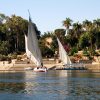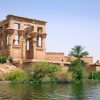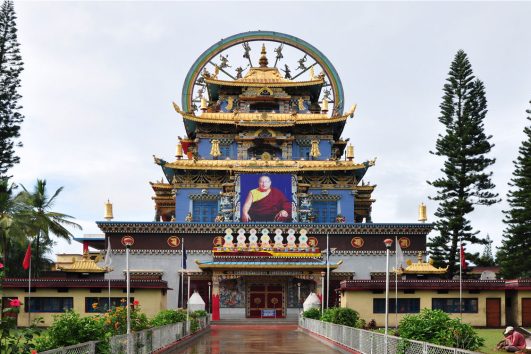Aswan: A Jewel on the Nile
Nestled on the banks of the majestic Nile River in Egypt, Aswan stands as a testament to the rich tapestry of history, culture, and natural beauty that defines this ancient city. Aswan’s significance in Egypt’s heritage cannot be overstated, as it has played a pivotal role in the country’s development for thousands of years. In this exploration of Aswan, we will delve into its geographical location, historical importance, prominent landmarks and attractions, its unique natural beauty, and the vibrant cultural heritage that makes it a must-visit destination.
Geographical Location
Location within Egypt
Aswan is located in the southern part of Egypt, serving as the gateway to Upper Egypt. Situated about 680 kilometers south of Cairo, it’s strategically positioned at the border of Egypt and Sudan.
Topography and Natural Features
Aswan’s topography is marked by the Nile River, which meanders through the city, providing lush greenery along its banks. The city is also surrounded by rocky terrain and the vast Nubian Desert.
Climate and Weather
Aswan boasts a desert climate characterized by scorching summers and mild winters. Sunshine is abundant throughout the year, making it a popular destination for sunseekers.
Historical Significance
Ancient History of Aswan
- Role in Ancient Egypt: Aswan played a crucial role in ancient Egypt, primarily as a source of granite for monumental construction, including the pyramids and temples. Its quarries supplied the stones for countless historic structures.
- Monuments and Temples: The city is home to numerous historic sites, including the famous Temple of Philae, dedicated to the goddess Isis, and the magnificent Abu Simbel Temples, carved into the mountainside during the reign of Ramses II.
Modern History
- Colonial Era and British Influence: During the colonial era, Aswan gained importance as a strategic point along the Nile. It became a British administrative center and played a role in the development of the Egyptian railway system.
- Nasser’s High Dam and Its Impact: In the 20th century, Aswan witnessed the construction of the Aswan High Dam, a monumental engineering feat. The dam transformed the region, providing flood control, electricity, and irrigation, but also resulting in the displacement of Nubian communities.
- Nubian Resettlement: The construction of the dam led to the resettlement of Nubians, indigenous to the region. Efforts have been made to preserve their culture and traditions.
Landmarks and Attractions
Aswan High Dam
- Construction and Purpose: The Aswan High Dam was built in the mid-20th century to control the annual flooding of the Nile and harness its power for electricity generation and irrigation.
- Impact on the Region: The dam’s creation led to the formation of Lake Nasser, one of the world’s largest man-made lakes, which has transformed the landscape and provided opportunities for water-based activities.
Philae Temple
- History and Significance: The Temple of Philae, dedicated to the goddess Isis, is a stunning example of ancient Egyptian architecture and has been painstakingly relocated to Agilkia Island to preserve it from the rising waters caused by the Aswan High Dam.
- Relocation Project: The UNESCO-sponsored relocation project was a monumental achievement in preserving Egypt’s heritage.
Abu Simbel Temples
- History and Relocation: The Abu Simbel Temples are two massive rock temples built by Ramses II. They were relocated to higher ground to prevent submersion by Lake Nasser.
- UNESCO World Heritage Site: These temples are a UNESCO World Heritage Site and continue to awe visitors with their grandeur.
Nubian Villages and Culture
- Traditional Nubian Architecture: Nubian villages in and around Aswan showcase unique architecture characterized by colorful, domed houses made from locally sourced materials.
- Nubian Arts and Crafts: Visitors have the opportunity to explore Nubian arts and crafts, including intricate jewelry and vibrant textiles.
Natural Beauty
The Nile River in Aswan
- Felucca Rides: Exploring the Nile on a traditional felucca boat is a popular way to experience the city’s natural beauty.
- Botanical Gardens on Kitchener’s Island: Kitchener’s Island boasts lush botanical gardens, a serene escape from the desert surroundings.
Nubian Desert
- Desert Landscapes and Scenery: The Nubian Desert offers stunning landscapes, including towering sand dunes and dramatic rock formations.
- Adventure Tourism Opportunities: Adventure enthusiasts can partake in activities like desert safaris and camel treks to fully appreciate the desert’s allure.
Cultural Heritage
Nubian Music and Dance
Nubian culture comes alive through vibrant music and dance performances that captivate visitors with their rhythmic melodies and expressive movements.
Nubian Cuisine
Sample Nubian cuisine, which features flavorsome dishes like ful medames and deliciously spiced grilled meats.
Local Festivals and Celebrations
Participate in local festivals like the Abu Simbel Sun Festival, which celebrates the alignment of sunlight in the temple’s inner sanctum.
Economy and Industry
Agriculture and Agriculture-Related Industries
Aswan’s fertile lands along the Nile support agriculture, including the cultivation of crops like dates and citrus fruits.
Tourism as a Major Economic Driver
Tourism is a vital part of Aswan’s economy, with visitors coming to explore its historical sites, experience its unique culture, and revel in its natural beauty.
Development Projects and Investments
Efforts are ongoing to promote sustainable tourism, protect historical sites, and support local communities.
Challenges and Conservation Efforts
Environmental Challenges
- Water Management Issues: The Aswan High Dam has raised concerns about water management, affecting the flow of the Nile and surrounding ecosystems.
- Desertification: The encroachment of the desert poses challenges to agriculture and the environment.
Cultural Preservation Efforts
- Protection of Nubian Heritage: Initiatives aim to preserve the Nubian heritage and provide opportunities for Nubian communities.
- Sustainable Tourism Practices: Efforts are underway to promote sustainable tourism practices that benefit local communities and protect historical sites.







Tour Reviews
There are no reviews yet.
Leave a Review